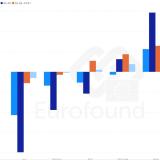
Ocuparea forței de muncă și piețele muncii
Ocuparea forței de muncă și piețele muncii fac obiectul uneia dintre cele șase activități principale din cadrul programului de activitate al Eurofound pentru perioada 2021-2024. Eurofound va funcționa în continuare ca centru de expertiză pentru monitorizarea și analiza evoluțiilor pieței muncii, în special având în vedere că piețele europene ale muncii se confruntă cu provocări majore în urma pandemiei de COVID-19. Activitățile sale de cercetare și de culegere de date vor pune accentul pe consecințele pandemiei asupra muncii și a ocupării forței de muncă, precum și pe modul de a menține funcționarea pieței muncii și caracterul favorabil incluziunii al acesteia.
În perioada 2021–2024, activitățile de cercetare desfășurate de Eurofound vor oferi informații importante cu privire la provocările și la perspectivele din domeniul ocupării forței de muncă și al piețelor muncii din UE. Eurofound joacă un rol important în monitorizarea tendințelor de pe piața muncii, precum și în monitorizarea impactului acestor tendințe asupra diferitelor categorii de lucrători.
Activitățile de cercetare se vor axa, în general, pe structura în schimbare a pieței muncii, utilizând instrumentele de monitorizare consacrate ale Eurofound, Monitorul european al locurilor de muncă (EJM) și Monitorul european al restructurărilor (ERM), alături de datele furnizate de Eurostat. În contextul unei rate a șomajului ridicate preconizate în unele țări, regiuni, sectoare și ocupații, care afectează și lucrătorii cu cele mai precare locuri de muncă și lucrătorii cei mai vulnerabili, aceste instrumente vor contribui la identificarea sectoarelor, a ocupațiilor și a calificărilor care se află într-un proces de dezvoltare sau de regres. ERM va continua, de asemenea, să examineze evenimentele de restructurare la scară largă, instrumentele legislative și de sprijin, precum și măsurile luate de partenerii sociali și de autoritățile publice pentru acordarea de asistență lucrătorilor care se mută de la un loc de muncă la altul sau de la un sector la altul.
Eurofound se va concentra, de asemenea, pe deficitul de forță de muncă și pe resursele umane și talentele insuficient utilizate în anumite sectoare și ocupații, fenomene accentuate în timpul pandemiei de COVID-19, analizând intervențiile la nivel de politici și practicile întreprinderilor. Temele specifice vor include neconcordanța de competențe , timpul de lucru , mobilitatea geografică sau profesională și integrarea migranților , precum și includerea pe piața muncii a grupurilor subreprezentate, cum ar fi tinerii, femeile și persoanele cu dizabilități . Eurofound va analiza, de asemenea, sectoarele afectate în mod tradițional de deficitul de forță de muncă, o problemă care devine tot mai presantă din cauza pandemiei. Această activitate va contribui la lucrările de pregătire a următoarei ediții a Sondajului european în rândul întreprinderilor (ECS) .
De asemenea, Eurofound va continua să colaboreze cu Centrul Comun de Cercetare (JRC) al Comisiei Europene în acest domeniu. Cercetările în materie de restructurare vor contribui la activitățile Fondului european de ajustare la globalizare (FEG) și ale Fondului social european Plus (FSE+). Se vor analiza legăturile cu agenția omoloagă Cedefop și cu Autoritatea Europeană a Muncii în ceea ce privește competențele și mobilitatea forței de muncă în contextul unor politici de ocupare a forței de muncă care vizează combaterea deficitului de forță de muncă.
„Încă există șase din zece persoane care au contract de muncă pe durată nedeterminată, nelimitată. Deși cifrele pe care le deținem cu privire la „munca atipică”, și anume la munca cu fracțiune de normă și pe perioadă determinată, nu s-au schimbat cu adevărat în ultimii cinci - zece ani, acestea ascund o trecere către forme de muncă mai precare, iar persoanele cu contracte precare nu au același acces la ocuparea forței de muncă sau la protecție socială.”
Tina Weber, directoare de cercetare, unitatea Ocuparea forței de muncă







































